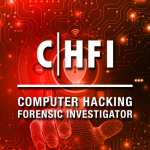Computer Hacking Forensic Investigator (CHFI) - EC-Council
Course Overview

The Computer Hacking Forensic Investigator (CHFI) certification by EC-Council is a premier credential that validates expertise in identifying, investigating, and analyzing cyberattacks and digital crimes. This course equips professionals with the skills needed to collect and preserve digital evidence systematically, ensuring its admissibility in legal proceedings.
Through this program, participants will learn advanced forensic techniques, methodologies, and tools to uncover, recover, and analyze digital evidence from compromised systems, networks, and devices. CHFI emphasizes real-world scenarios, preparing individuals to investigate incidents such as hacking, malware attacks, data breaches, and insider threats.
With a strong focus on forensics best practices and legal compliance, CHFI is the ideal certification for professionals involved in incident response, law enforcement, and cybersecurity. It bridges the gap between technical know-how and investigative processes, empowering individuals to uncover the truth behind cyber incidents and safeguard organizations from future threats.
- Fundamentals of digital forensics and its importance in cybersecurity.
- Cybercrime investigation processes and methodologies.
- Techniques for collecting, preserving, and documenting digital evidence.
- Data recovery methods for retrieving lost or deleted information.
- Use of forensic tools such as EnCase, FTK, and Autopsy.
- Analysis of operating systems, including Windows, Linux, and macOS, for forensic evidence.
- Network forensics to analyze traffic and identify malicious activities.
- Email forensics to uncover fraud, phishing, and malicious communications.
- Mobile forensics for extracting and analyzing data from mobile devices.
- Malware forensics for identifying and analyzing malicious software.
- Legal and ethical considerations in handling digital evidence.
- Practical application of forensic techniques through case studies and labs.
- Reporting and presenting forensic findings for legal or organizational purposes.
Pre-requisite
- No formal prerequisites are required for the CHFI course.
- A basic understanding of IT concepts and cybersecurity is recommended.
Benefits
- Enhanced Forensics Expertise: Gain in-depth knowledge of digital forensics techniques and tools.
- Career Advancement: Qualify for roles such as Digital Forensics Analyst, Incident Responder, or Cybercrime Investigator.
- Global Recognition: Obtain a credential that is recognized and respected worldwide.
- Legal Compliance: Learn to handle digital evidence in accordance with legal standards and procedures.
- Practical Skills: Master hands-on methodologies to investigate cybercrimes and recover lost or corrupted data.
Who Should Take This Course?
- Incident Responders: Professionals managing security incidents and breaches.
- IT Professionals: System administrators, network engineers, and security analysts.
- Law Enforcement Personnel: Investigators working on cybercrime cases.
- Cybersecurity Specialists: Individuals specializing in threat detection and mitigation.
- Legal and Compliance Teams: Professionals ensuring digital investigations meet legal requirements.
- Students and Graduates: Individuals pursuing careers in digital forensics or cybersecurity.
